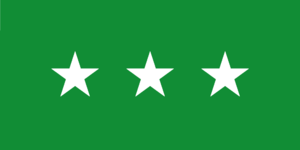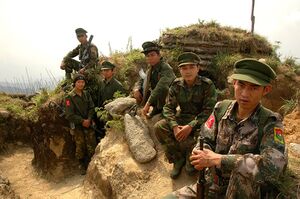Green Army: Difference between revisions
mNo edit summary |
m Text replacement - "Corumm" to "Daxia" |
||
| (One intermediate revision by the same user not shown) | |||
| Line 4: | Line 4: | ||
| image = File:Flag of the UDPKS.png | | image = File:Flag of the UDPKS.png | ||
| dates = 1983 - present | | dates = 1983 - present | ||
| country = [[ | | country = [[Daxia]] | ||
| type = [[wikipedia:Navy|Army]] | | type = [[wikipedia:Navy|Army]] | ||
| role = Land warfare | | role = Land warfare | ||
| Line 22: | Line 22: | ||
| commander3_label = Sector 2 Commander | | commander3_label = Sector 2 Commander | ||
}} | }} | ||
The '''Green Army''' or '''Hluttaw Sahn''' is a paramilitary and political organization in the island of [[Zhijun]]. Formed in the early 1980’s to fight the | The '''Green Army''' or '''Hluttaw Sahn''' is a paramilitary and political organization in the island of [[Zhijun]]. Formed in the early 1980’s to fight the Daxian central government and its control of Zhijun, it held on to portions of the island with various degrees of success. Increasing pressure by [[Linge Chen]]’s government led to its weakening and partial atomization into separate groups, with most of these cells later being co opted into submission by the government. In the present day the Zhijun Regional Administration is entirely under the control of the Green Army, from the office of Chief Minister to all three hundred seats in the Zhijun Sovereign Assembly. At the same time the Green Army functions as a military unit under the direct control of the Ministry of Interior, participating in various conflicts across the Daxian domain. | ||
===History=== | ===History=== | ||
The Green Army's origin lie in the historic and geographic divide between two communities of | The Green Army's origin lie in the historic and geographic divide between two communities of Daxian settlers that inhabit Zhijun. On one hand stand those living in the island's central and less accesible highlands who are known locally as the Hluttaw or Green Men and who made their living as subsistence farmers or breeding small quantities of livestock. On the other side are the wealthier settlers living on the coast known as the Shwayttaw or Gold Men, richer and more cosmopolitan due to trading with other polities around the Sea of Istroya. The Shwayttaw were also more firmly under the control of the metropolis and were considered a loyal and reliable population. Over the centuries of Daxian control, the Hluttaw would routinely burst forth from the highlands to raid the coastal areas before being pushed back by imperial retribution. | ||
====Hluttaw Rebellion==== | ====Hluttaw Rebellion==== | ||
The arrival of Linge Chen and his PCD to power in 1992 caused drastic change to the situation on Zhijun. Chen immediately strenghtened the organs of repression by sending several secret police divisions to Zhijun and letting them loose upon the island to squash all dissent. Several Hluttaw groups led by a former policeman named Kan Kuw San reacted to the crackdown by coalescing into the Green Army to fight the government. The Green Army slipped into the hills to start their insurgency. One of the first Green Army actions was a raid on the Goshen labor camp where they managed to free and forcibly recruit around four hundred inmates; a mixed group of political prisoners and petty criminals. | The arrival of Linge Chen and his PCD to power in 1992 caused drastic change to the situation on Zhijun. Chen immediately strenghtened the organs of repression by sending several secret police divisions to Zhijun and letting them loose upon the island to squash all dissent. Several Hluttaw groups led by a former policeman named Kan Kuw San reacted to the crackdown by coalescing into the Green Army to fight the government. The Green Army slipped into the hills to start their insurgency. One of the first Green Army actions was a raid on the Goshen labor camp where they managed to free and forcibly recruit around four hundred inmates; a mixed group of political prisoners and petty criminals. | ||
| Line 35: | Line 35: | ||
===Activities=== | ===Activities=== | ||
During the phase of armed struggle the Green Army engaged not only in combat and sabotage operations against government targets, it also conducted state building and economic activities of many varieties in the areas under its control. The Green Army extorted taxes and royalties from every business in its territory, from sugar plantations, factories, small shops and independent professionals. It operated a human smuggling operation for people trying to leave the island. It routinely seized the homes and property of internally displaced people and either resold it or distributed it to its own fighters. Kidnapping people and asking the relatives for ransom was also a common tactic. | During the phase of armed struggle the Green Army engaged not only in combat and sabotage operations against government targets, it also conducted state building and economic activities of many varieties in the areas under its control. The Green Army extorted taxes and royalties from every business in its territory, from sugar plantations, factories, small shops and independent professionals. It operated a human smuggling operation for people trying to leave the island. It routinely seized the homes and property of internally displaced people and either resold it or distributed it to its own fighters. Kidnapping people and asking the relatives for ransom was also a common tactic. | ||
[[Category: | [[Category:Daxia]] | ||
Latest revision as of 01:07, 29 April 2023
| Green Army | |
|---|---|
| Hluttaw Sahn | |
 | |
| Active | 1983 - present |
| Country | Daxia |
| Type | Army |
| Role | Land warfare |
| Size | 60,000 |
| Commanders | |
| Supreme Commander | Hun San |
| Sector 1 Commander | Ming Rui |
| Sector 2 Commander | Brak Chan |
The Green Army or Hluttaw Sahn is a paramilitary and political organization in the island of Zhijun. Formed in the early 1980’s to fight the Daxian central government and its control of Zhijun, it held on to portions of the island with various degrees of success. Increasing pressure by Linge Chen’s government led to its weakening and partial atomization into separate groups, with most of these cells later being co opted into submission by the government. In the present day the Zhijun Regional Administration is entirely under the control of the Green Army, from the office of Chief Minister to all three hundred seats in the Zhijun Sovereign Assembly. At the same time the Green Army functions as a military unit under the direct control of the Ministry of Interior, participating in various conflicts across the Daxian domain.
History
The Green Army's origin lie in the historic and geographic divide between two communities of Daxian settlers that inhabit Zhijun. On one hand stand those living in the island's central and less accesible highlands who are known locally as the Hluttaw or Green Men and who made their living as subsistence farmers or breeding small quantities of livestock. On the other side are the wealthier settlers living on the coast known as the Shwayttaw or Gold Men, richer and more cosmopolitan due to trading with other polities around the Sea of Istroya. The Shwayttaw were also more firmly under the control of the metropolis and were considered a loyal and reliable population. Over the centuries of Daxian control, the Hluttaw would routinely burst forth from the highlands to raid the coastal areas before being pushed back by imperial retribution.
Hluttaw Rebellion
The arrival of Linge Chen and his PCD to power in 1992 caused drastic change to the situation on Zhijun. Chen immediately strenghtened the organs of repression by sending several secret police divisions to Zhijun and letting them loose upon the island to squash all dissent. Several Hluttaw groups led by a former policeman named Kan Kuw San reacted to the crackdown by coalescing into the Green Army to fight the government. The Green Army slipped into the hills to start their insurgency. One of the first Green Army actions was a raid on the Goshen labor camp where they managed to free and forcibly recruit around four hundred inmates; a mixed group of political prisoners and petty criminals.

Government Allies
Amid the increasing crackdown, disputes over strategy, disposition of loot and extortion rackets erupted inside the Green Army. A faction named Green Army-North Command led by Hun San emerged that disputed Kan Kuw San's leadership. After a failed assasination attempt with a grenade on Kuw San, open hostilities commenced. Vicious fighting too place in Kyitaw, Ato and Goshen districts before Hun San's faction was forced to retreat with heavy losses. Government agents approached Green Army-North Command with an offer of amnesty and military support to destroy Kan Kuw San's faction, which was accepted. In this manner Hun San's group was coopted into becoming a proxy force for the Ministry of Interior.
Activities
During the phase of armed struggle the Green Army engaged not only in combat and sabotage operations against government targets, it also conducted state building and economic activities of many varieties in the areas under its control. The Green Army extorted taxes and royalties from every business in its territory, from sugar plantations, factories, small shops and independent professionals. It operated a human smuggling operation for people trying to leave the island. It routinely seized the homes and property of internally displaced people and either resold it or distributed it to its own fighters. Kidnapping people and asking the relatives for ransom was also a common tactic.